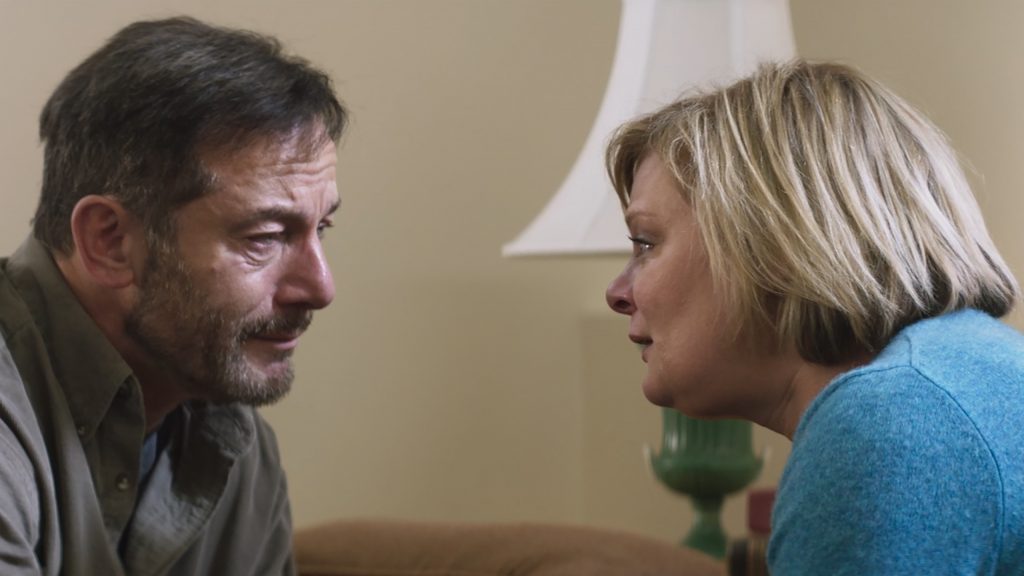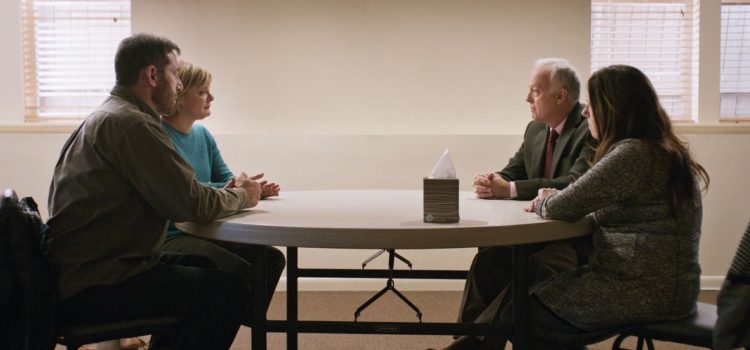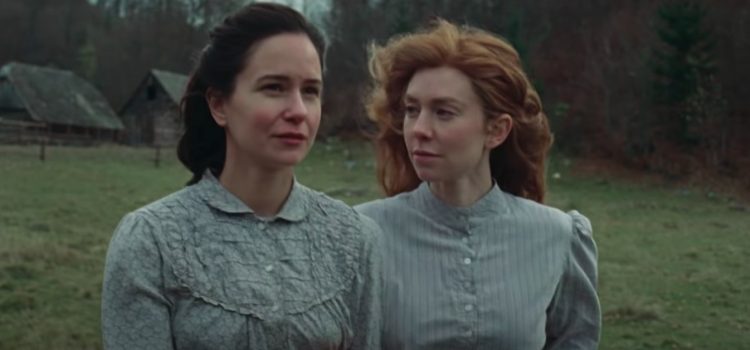By Alex McPherson
Unrelenting and riveting, director Fran Kranz’s directorial debut, “Mass,” provides a complex meditation on grief and healing, as well as a mesmerizing showcase of acting talent.
The story largely takes place within a rural Episcopalian church, where the parents of two children gather to have a discussion concerning an incident that’s haunted them for six years. One of these children, named Evan, was slain in a school shooting by the other, named Hayden, who then killed himself. The parents attempt to gain greater insight and reach emotional catharsis after their lives were permanently changed.
Following an opening where church employees Judy (Breeda Wool) and Anthony (Kagen Albright) anxiously prepare the sterile room for the meeting, all the while supervised by social worker Kendra (Michelle N. Carter) and a large crucifix on the wall, parents Jay (Jason Isaacs) and Gail (Martha Plimpton) arrive. Jay puts up a veneer of strength and stability, but there’s a simmering anger bubbling within that threatens to break loose at any moment. Gail is nearly monosyllabic and often requires Jay to speak for her, only growing more cagey when Hayden’s parents — uptight, sharply dressed Richard (Reed Birney) and deeply earnest Linda (Ann Dowd) — show up. As the conversation shifts from awkward pleasantries to burning anger, rage, sorrow, and compassion, we’re forced to sit with these people in their raw exchanges, authentic in their relatable contradictions.
Indeed, “Mass” is a harrowing, bleak, and profoundly real story, unfolding at an almost real-time pace. Kranz’s first feature plays like a horror film. It leaves viewers with the ideas that grief can’t always be overcome, that fighting for clear-cut answers can itself victimize, that communicating anguish is a messy and unpredictable task, and that true empathy is all-but-required to make peace with a world that refuses to make sense.
Needless to say, “Mass” isn’t an easy watch, but it’s impossible to avert your eyes from the screen once it begins. We feel the parents’ claustrophobia and vulnerability in being molded from the horrific act of violence all these years later. There’s no tidy resolution to this meeting of four broken souls, presented with the best acting I’ve seen all year so far. Each of them approaches the situation with different attitudes and perspectives, which gradually erode and evolve as their conversation carries on.
Isaacs brilliantly depicts Jay’s internal battle of impatience, lending the film considerable tension as tempers escalate. Plimpton shines as a mother who has experienced irreparable loss and who enters the conversation unsure of what exactly she wants to get out of it — retribution or forgiveness? Richard and Linda, the parents of the shooter, are just as layered. Richard’s initial defensiveness belies the guilt he harbors, blaming himself for Hayden’s decisions. Linda, gestures of goodwill notwithstanding, is also self-loathing — torn between her motherly love for Hayden and the act that forever harms his memory. Portrayed by Dowd with heartbreaking power, Linda at one point states that she continues to mourn her son even as her community doesn’t.
Kranz, who wrote the screenplay in addition to directing, excels in giving his subjects naturalistic dialogue that never once loses its authenticity. Hot button topics are brought up briefly, but the film doesn’t jam them into the narrative. Rather, by focusing on a small group of individuals confronting a deeply personal disaster, “Mass” handles its sensitive subject matter in a respectful manner without talking down to viewers. Additionally, religious aspects of the plot are used for subversive means. The difficulty of confronting the unspeakable and practicing forgiveness can’t be done through belief alone, after all, but through individual determination and perseverance.
Although “Mass” would likely work equally as well as a stage production, Kranz and editor Yang Hua Hu deploy cinematic stylings that, for the most part, amplify the proceedings. The editing gives Isaacs, Plimpton, Birney, and Dowd each their time in the spotlight, while the camera work progresses from static to handheld, and the aspect ratio condenses with new revelations. Kranz also brings the camera outside the church at brief intervals, emphasizing critical moments while not always feeling totally necessary.

In the end, “Mass” is tough to recommend to general audiences, but a film that’s difficult to fault in any particular area. It’s a near-perfectly constructed drama, one that refuses to sugarcoat life’s uncompromising reality, and that remains all the better for it.
“Mass” is a 2021 drama written and directed by Fran Kranz. It stars Ann Dowd, Martha Plimpton, Reed Birney and Jason Isaacs. It is rated PG-13 for thematic content and brief strong language, and the runtime is 1 hour, 50 minutes. In theaters Oct. 22. Alex’s Grade: A

Lynn (Zipfel) Venhaus has had a continuous byline in St. Louis metro region publications since 1978. She writes features and news for Belleville News-Democrat and contributes to St. Louis magazine and other publications.
She is a Rotten Tomatoes-approved film critic, currently reviews films for Webster-Kirkwood Times and KTRS Radio, covers entertainment for PopLifeSTL.com and co-hosts podcast PopLifeSTL.com…Presents.
She is a member of Critics Choice Association, where she serves on the women’s and marketing committees; Alliance of Women Film Journalists; and on the board of the St. Louis Film Critics Association. She is a founding and board member of the St. Louis Theater Circle.
She is retired from teaching journalism/media as an adjunct college instructor.


